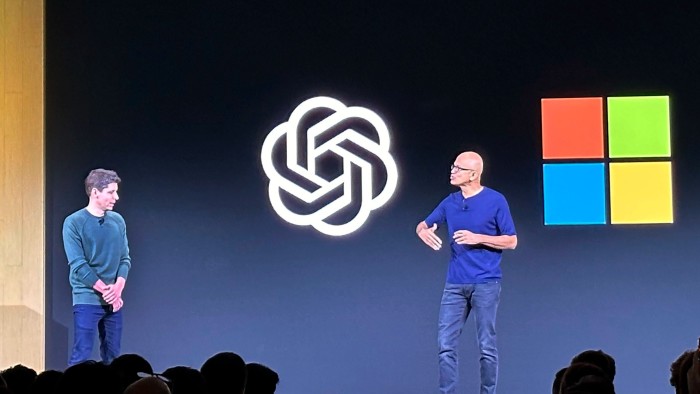Good morning. Last week, we talked about India’s slowing GDP and now official estimates have placed it at 6.4 per cent, the slowest year since the pandemic. Over the next few weeks, we’ll assess the impact this will have on our investment and consumption climate and what the government’s Budget proposals to spur growth are likely to be. In today’s newsletter, we also take a look at the bull run in defence-sector stocks in Indian equities. But first, Microsoft’s chief executive is on a whirlwind tour of India, leaving a trail of gifts behind him. It’s good news, but could it have been better?
Looking a gift horse in the mouth
Microsoft chief Satya Nadella was in India earlier this week, dropping gifts like a belated Santa Claus. Local news reports led with the $3bn investment that the company is planning to make over the next two years in India. This money is mostly for developing artificial intelligence and cloud services under Azure, Microsoft’s cloud computing platform, and part of it will also go towards training 10mn Indians on AI skills by 2030. Nadella described this as the single largest expansion that Microsoft has ever done in India.
Nadella is excited by the level of development activity going on in India; some 17mn Indian developers are on GitHub, a platform that allows developers to create, store and share their code, which Microsoft acquired in 2018. He expects Indians to be the largest community on GitHub by 2028. Indian developers are working on more than 30,500 generative AI projects.
These numbers are interesting but not phenomenal. The global AI arms race, at this point, is clearly between the US and China. American technology companies are hoping the incoming Donald Trump administration will not place any regulatory shackles on the development of AI in order to stay ahead of China. These groups include Microsoft itself, whose president Brad Smith wrote an impassioned blog post on the topic earlier this week.
While a few Indian companies are doing some interesting work on AI, at this point they are nowhere near any significant breakthroughs in technology or product development that would make them leading global players. Microsoft’s $3bn investment in India should also be viewed within the company’s global plans: it expects to spend $80bn this year developing data centres globally, with more than half of that figure invested in the US.
My take may seem negative about India to some, especially those who feel we should be taking this chance to revel in the praise Nadella has heaped on the country. I see my view as that of a concerned parent urging their child to prepare before an examination. In investing in our technological future, it will serve us better to be ambitious and driven at this point than to be sitting back in smug satisfaction. All I am doing is looking Microsoft’s gift horse in the mouth and finding it to be too small.
Know an Indian company that is doing groundbreaking work on AI? Tell me about it at indiabrief@ft.com
More news you should know
-
Here’s how a handful of X accounts took Elon Musk “down the rabbit hole” on UK politics.
-
Manmohan Singh “was one of the greatest men I have known”, writes the FT’s Martin Wolf in his tribute to the former prime minister.
-
Will AI save online dating?
-
For the weekend, I recommend this review of House of Huawei by Eva Dou, an authoritative account of the secretive Chinese tech company.
-
Apple’s $1bn offer was not enough to lift Indonesia’s iPhone 16 ban.
-
China has earmarked $11bn to subsidise rice cookers and microwaves to boost consumption.
On the defensive
The Make in India initiative is paying off, quite literally, in the arms and armaments industry. There’s a bull run in stocks of companies that are engaged in defence production. This trend has not gone unnoticed by India’s mutual fund industry, with four large asset management companies launching funds that are dedicated to investing in this sector. Companies such as Hindustan Aeronautics, missile maker Bharat Dynamics and Mazagon Dock Shipbuilders, the country’s largest naval shipyard, have seen their order books swell as the Modi government pushes the military to shop locally. Consequently, their share prices have significantly outperformed the index.
While state-owned companies are still the largest manufacturers of defence equipment, big Indian conglomerates such as the Adani Group, Larsen & Toubro and the Tata Group have started or augmented their investments in the sector in recent years. India is hoping to eventually become an exporter in the arms business, after being the world’s largest importer for more than two decades.
These are great developments for India’s manufacturing sector as well as the defence industry. I am less enthused about the defence funds. The dominant companies in the sector are government owned, with very little free float in the market. Big fund houses buying and selling this limited float can lead to high price fluctuations, and it is anyone’s guess whether retail investors are aware of these risks.
Launching funds with sectoral themes to quickly mop up some fresh funds is an old habit in the asset management business, something I remember writing about 20 years ago as a young reporter covering the industry. Every once in a while, it leads to some finger wagging from the regulator and then it is business as usual. The more things change, the more they stay the same.
Go figure
As cars get more software heavy, US automakers are seeing an increasing number of software-related car recalls.
US car recalls in 2024 for software updates
Read, hear, watch
I am reading Character Limit: How Elon Musk Destroyed Twitter (love a title that is direct and to the point), written by journalists Kate Conger and Ryan Mac. I first heard about the book on a podcast, Elon’s Spies. The book is a fascinating, and sometimes frightening, insight into how the world’s richest man operates. It is an especially chilling read at a time when he is taking on the global political order, routinely barking insults at world leaders.
I am also enjoying the series Why Women Kill on JioCinema. It’s a comical and clever look at marriages through three different decades. Warning: the men on the show don’t end up looking very good.
Buzzer round
According to Donald Trump, who operates the Panama Canal?
Send your answer to indiabrief@ft.com and check Tuesday’s newsletter to see if you were the first one to get it right.
Quick answer
Which Indian IT major do you think will post the best results this quarter? Here’s how you voted. TCS, whose results arrived yesterday, seems a clear favourite. We’ll have to wait for HCL Tech on Monday and Infosys next Thursday to spot the Nostradamuses among us.

Thank you for reading. India Business Briefing is edited by Tee Zhuo. Please send feedback, suggestions (and gossip) to indiabrief@ft.com.
Source link









